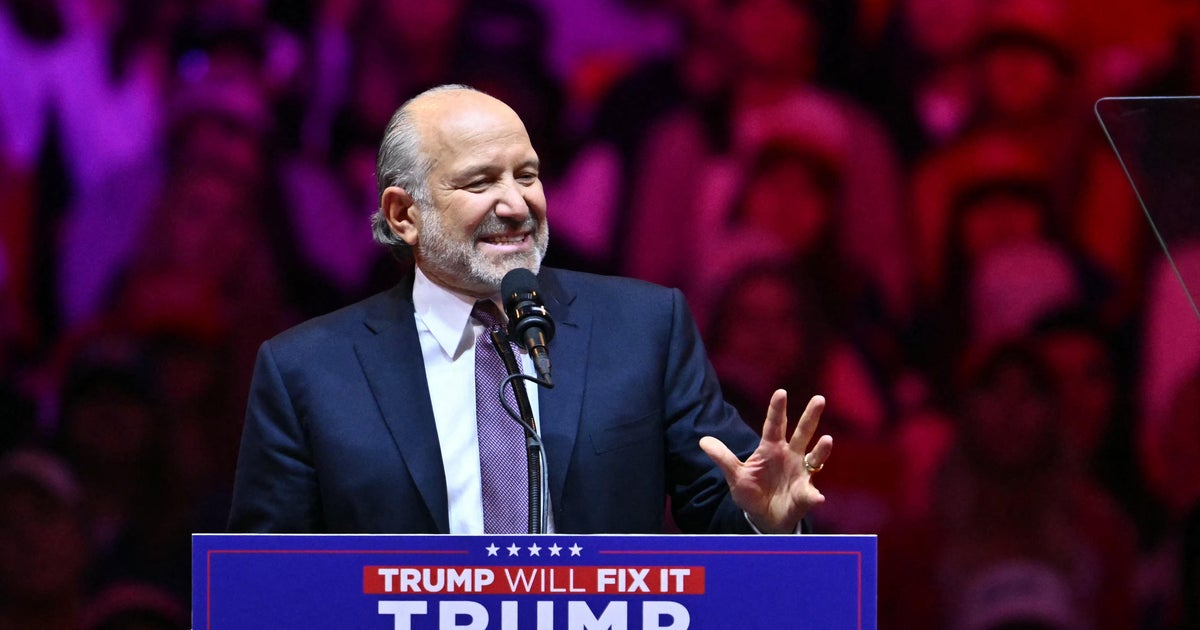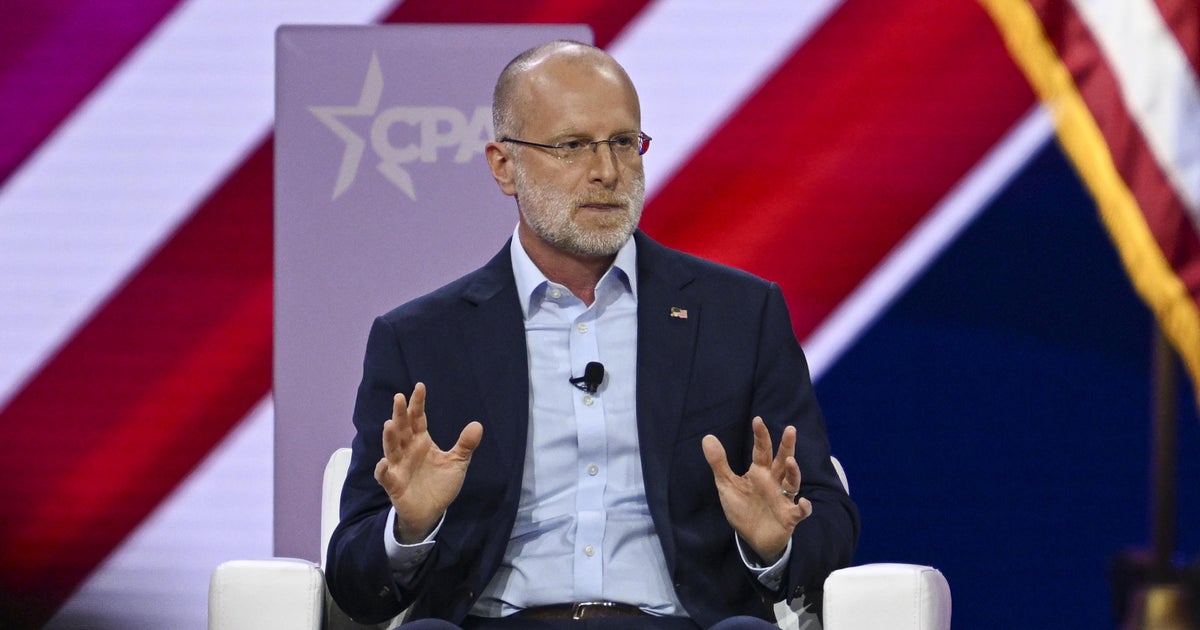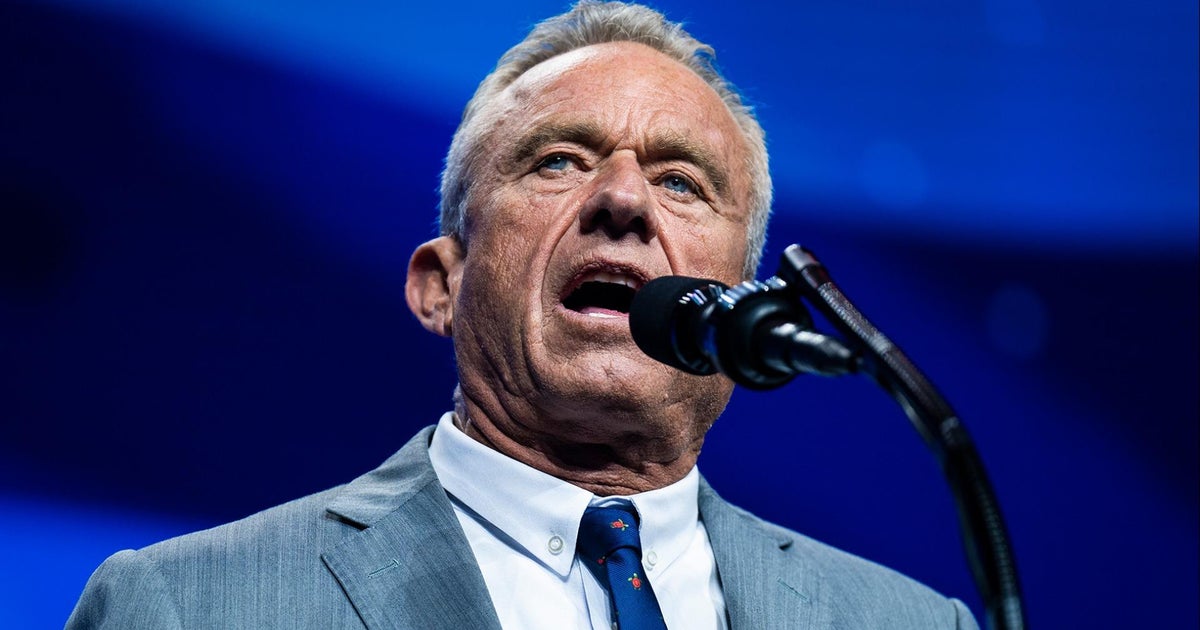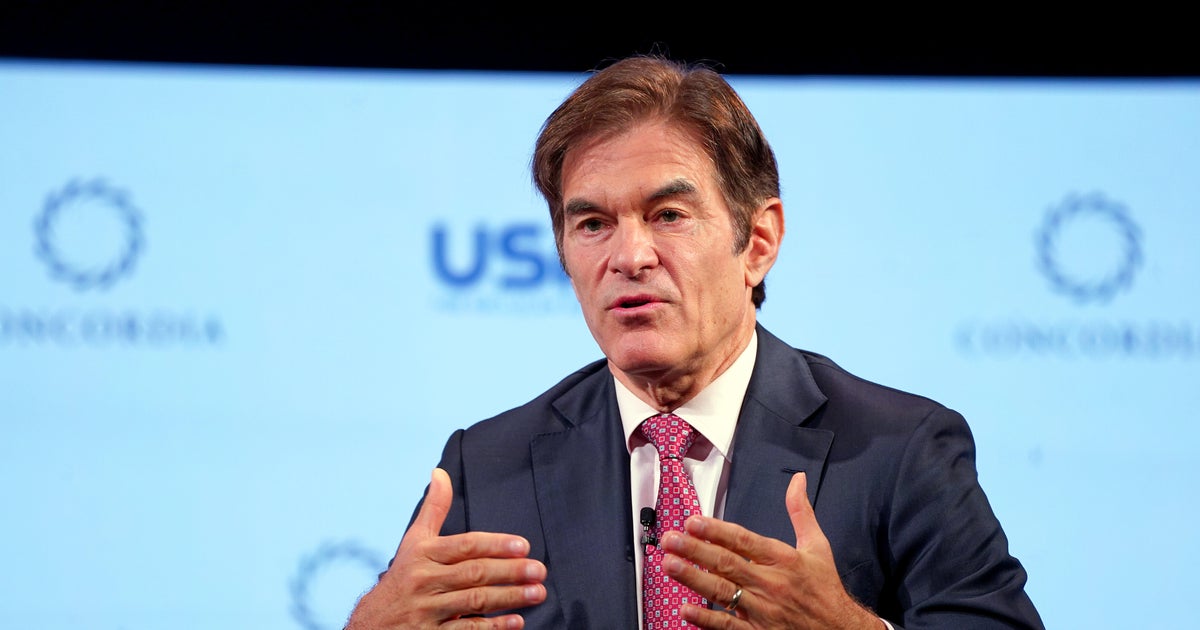Transcript: Defense Secretary James Mattis on "Face the Nation," May 28, 2017
President Donald Trump has stepped onto the international stage with his first trip abroad as president. Following a deadly bombing on Monday in Manchester, much of the trip's focus turned to the global terrorist threat and the battle against the Islamic State of Iraq and Syria (ISIS).
In a special Memorial Day broadcast, "Face the Nation" sat down with Secretary of Defense James Mattis. In his first television interview since he assumed his Cabinet position, Mattis discussed the fight against ISIS, as well as North Korea, the Paris climate accord, Mr. Trump's message on NATO -- and more.
What follows is a full transcript of the interview, broadcast Sunday May 28, 2017 on "Face The Nation."
PART ONE
JOHN DICKERSON: The offensive in Mosul is taking place as American forces are picking up the tempo against ISIS in all theaters. We sat down with Defense Secretary James Mattis at the US Military Academy at West Point Saturday and asked him about the new strategy.
SECRETARY JAMES MATTIS: Our strategy right now is to accelerate the campaign against ISIS. It is a threat to all civilized nations. And the bottom line is we are going to move in an accelerated and reinforced manner, throw them on their back foot. We have already shifted from attrition tactics where we shove them from one position to another in Iraq and Syria, to annihilation tactics where we surround them. Our intention is that the foreign fighters do not survive the fight to return home to North Africa, to Europe, to America, to Asia, to Africa. We're not going to allow them to do so. We're going to stop them there and take apart the caliphate.
JOHN DICKERSON: Explain what it means to be moving in an "annihilation" posture as opposed to attrition?
SECRETARY JAMES MATTIS: Well, attrition is where you keep pushing them out of the areas that they're in, John. And what we intend to do by surrounding them is to not allow them to fall back, thus, reinforcing themselves as they get smaller and smaller, making the fight tougher and tougher.
You see that right now, for example, in western Mosul that is surrounded and the Iraqi-- security forces are moving against them. Tal Afar is now surrounded. We have got efforts underway right now to surround their self-declared caliphate capital of Raqqa. That surrounding operation is going on. And once surrounded, then we'll go in and clean them out.
JOHN DICKERSON: One of the things you have mentioned in this new accelerated tempo is that the president has delegated authority to the right level. What does that mean?
SECRETARY JAMES MATTIS: When you're in operations, the best thing you can do at the top level is get the strategy right. You have to get the big ideas right, you have to determine what is the policy, what is the level of effort you're willing to commit to it? And then you delegate to those who have to execute that strategy to the appropriate level. What's the appropriate level? It's the level where people are trained and equipped to take decisions so we move swiftly against the enemy.
There is no corporation in the world that would, in a competitive environment, try and concentrate all decisions at the corporate level.
But I would point out here that we have not changed the rules of engagement. There is no relaxation of our attention to protect the innocent. We do everything we can to protect the civilians, and actually lowering-- delegating the authority to the lower level allows us to do this better.
JOHN DICKERSON: After the annihilation has been done, does that mean you can't let it fall back into ISIS hands?
SECRETARY JAMES MATTIS: Once ISIS is defeated-- there's a larger effort underway to make certain that we don't just sprout a new enemy. We know ISIS is going to go down. We've had success on the battlefield. We've freed millions of people from being under their control, and not one inch of that ground that ISIS has lost has ISIS regained.
It shows the effectiveness of what we're doing. However, there are larger currents, there are larger confrontations in this part of the world, and we cannot be blind to those. That is why they met in Washington under Secretary Tillerson's effort to carry out President Trump's strategy to make certain we don't just clean out this enemy and end up with a new enemy in the same area.
JOHN DICKERSON: You served under President Obama. You're now serving President Trump. How are they different?
SECRETARY JAMES MATTIS: Everyone leads in their own way, John. In the case of the president, he has got to select the right people that he has trust in to carry out his vision of-- of a strategy.
Secretary Tillerson and I, we coordinate all of the-- the president's campaign. We just make certain that foreign policy is led by the State Department. I inform Secretary Tillerson of the military factors, and we make certain that then when we come out of our meetings, State Department and Defense Department are tied tightly together. And we can give straightforward advice to the Commander in Chief.
JOHN DICKERSON: President Trump has said, to defeat ISIS "There has to be a humiliation of ISIS." What does that mean?
SECRETARY JAMES MATTIS: I think as we look at this problem of ISIS, it's more than just an army. It's also a fight about ideas. And we have got to dry up their recruiting. We have got to dry up their fundraising. The way we intend to do it is to humiliate them, to divorce them from any nation giving them protection, and humiliating their message of hatred, of violence. Anyone who kills women and children is not devout. They have-- they cannot dress themselves up in false religious garb and say that somehow this message has dignity.
We're going to strip them of any kind of legitimacy. And that is why you see the international community acting in concert.
JOHN DICKERSON: When should Americans look to see victory?
SECRETARY JAMES MATTIS: This is going to be a long fight. The problems that we confront are going to lead to an era of frequent skirmishing. We will do it by, with, and through other nations. We will do it through developing their capabilities, to do a lot of the fighting, we'll help them with intelligence. Certainly, we can help train them for what they face. And you see our forces engaged in that from Africa to Asia. But at the same time, this is going to be a long fight and I don't put timelines on fights.
JOHN DICKERSON: What about civilian casualties as a result of this faster tempo?
SECRETARY JAMES MATTIS: Civilian casualties are a fact of life in this sort of situation. We do everything humanly possible consistent with military necessity, taking many chances to avoid civilian casualties at all costs.
JOHN DICKERSON: Under this new aggressive posture, what can be done that would not have been done, say, six months ago?
SECRETARY JAMES MATTIS: Probably the most important thing we're doing now is we're accelerating this fight. We're accelerating the tempo of it. We are going to squash the enemy's ability to give some indication that they're-- that they have invulnerability, that they can exist, that they can send people off to Istanbul, to Belgium, to Great Britain and kill people with impunity.
We're going to shatter their sense of invincibility there in the physical caliphate. That's only one phase of this. Then we have the virtual caliphate that they use the Internet. Obviously, we're going to have to watch for other organizations growing up. We cannot go into some kind of complacency. I'm from the American West. We have forest fires out there. And some of the worst forest fires in our history, the most damage were caused when we pulled the fire crews off the line too early. And so we're going to have to continue to keep the pressure on the enemy. There's no room for complacency on this.
JOHN DICKERSON: One hundreds civilians were killed after a U.S. bomb hit a building in Mosul in Iraq. Is this the result of this faster tempo? Is this the kind of thing Americans need to get used to as a natural byproduct of this strategy?
SECRETARY JAMES MATTIS: The American people and the American military will never get used to civilian casualties. And we will-- we will fight against that every way we can possibly bring our intelligence and our tactics to bear. People who have had tried to leave that city were not allowed to by ISIS. We are the good guys. We're not the perfect guys, but we are the good guys. And so we're doing what we can.
We believe we found residue that was not consistent with our bomb. So we believe that what happened there was that ISIS had stored munitions in a residential location. Showing, once again, the callous disregard that has characterized every operation they have run.
JOHN DICKERSON: Help people understand what a conflict with North Korea would be like and how it would be different?
SECRETARY JAMES MATTIS: A conflict in North Korea, John, would be probably the worst kind of fighting in most people's lifetimes. Why do I say this? The North Korean regime has hundreds of artillery cannons and rocket launchers within range of one of the most densely populated cities on earth, which is the capital of South Korea.
We are working with the international community to deal with this issue. This regime is a threat to the region, to Japan, to South Korea. And in the event of war, they would bring danger to China and to Russia as well. But the bottom line is it would be a catastrophic war if this turns into a combat if we're not able to resolve this situation through diplomatic means.
JOHN DICKERSON: North Korea's been testing missiles. Are they getting any better at their capability?
SECRETARY JAMES MATTIS: We always assume that with a testing program they get better with each test.
JOHN DICKERSON: You say North Korea is a threat to the region. Is North Korea a threat to the United States?
SECRETARY JAMES MATTIS: It is a direct threat to the United States. They have been very clear in their rhetoric we don't have to wait until they have an intercont- intercontinental ballistic missile with a nuclear weapon on it to say that now it's manifested completely.
JOHN DICKERSON: What is the line in North Korea that if the regime crosses that line, in your view, the U.S. should take action?
SECRETARY JAMES MATTIS: Yeah, I'd prefer not to answer that question, John. The president needs political maneuver room on this issue. We-- we do not draw red lines unless we intend to carry them out. We've made very clear that we're willing to work with China and we believe China has tried to be helpful in this regard.
JOHN DICKERSON: Give me a sense, if you can, of the time when you think North Korea could get to the point of no return.
SECRETARY JAMES MATTIS: We consider it a direct threat even today, the North Korean threat. As far as that specific threat, I don't want to put a timeline on it. At this time, what we know, I'd prefer to keep silent about because we may actually know some things the North Koreans don't even know.
JOHN DICKERSON: Let me switch to NATO. The president recently met with NATO leaders. He didn't mention the commitments in NATO, the so-called Article 5 commitment, an attack on one is an attack on all. Why not?
SECRETARY JAMES MATTIS: I think when President Trump chooses to go to NATO personally and stand there alongside the other more than two dozen nations in NATO, that was his statement, not words, actions.
JOHN DICKERSON: The president seems to need convincing on the power and importance of the NATO alliance. Do you have to convince him of how important NATO is?
SECRETARY JAMES MATTIS: We've had good talks about it, John. In my initial job interview with the president, he brought up his questions about NATO. And my response was-- that I thought that if we didn't have NATO that he would want to create it because it's a defense of our values, it's a defense of democracy.
He was very open to that. Obviously, he had to make a decision about whether or not he was going to nominate me to be the Secretary of Defense. And although I immediately showed him that my view on that was rather profoundly in support of NATO, he at that point nominated me.
JOHN DICKERSON: What do the Russians want?
SECRETARY JAMES MATTIS: Beats me. Right now, Russia's future should be wedded to Europe. Why they see NATO as a threat is beyond me. Clearly, NATO is not a threat.
But right now, Russia is choosing to be a strategic competitor for any number of reasons. But the bottom line is NATO is not a threat and they know it. They have no doubt about it.
JOHN DICKERSON: You have said that Russia is trying to break apart NATO. Is there--is the United States going to take any action to deal with Russia as a threat to NATO either in helping in the Balkans or in any other way?
SECRETARY JAMES MATTIS: Right now, we're dealing with Russia, attempting to deal with Russia, under President Trump's direction, in a diplomatic manner. At the same time while willing to engage diplomatically, we are going to have to confront Russia when it comes to areas where they attack us, whether it be with cyber, or they try to change borders using armed force. And that's, admittedly, a strategically uncomfortable position, engaging diplomatically, trying to find a way out of this situation, but confronting them where we must. And we're going to continue in this mode and hopefully soon our diplomats will work their magic and start moving us out of this quandary we find ourselves in.
JOHN DICKERSON: Let me ask you about the Paris Climate Accords. The president is going to make a decision on those.
SECRETARY JAMES MATTIS: I was sitting in on some of the discussions in Brussels, by the way, where climate change came up and the president was open, he was curious about why others were in the position they were in, his counterparts in other nations. And I'm quite certain the president is wide open on this issue as he takes in the pros and cons of that accord.
JOHN DICKERSON: What keeps you awake at night?
SECRETARY JAMES MATTIS: Nothing. I keep other people awake at night.
JOHN DICKERSON: Secretary of Defense, James Mattis. We'll have more of our interview later in the broadcast and we'll be back in one minute with filmmaker, Ken Burns.
PART TWO
JOHN DICKERSON: Finally, on this weekend, where we honor sacrifice and duty, we return to our conversation with Defense Secretary Mattis. We asked him about his concerns that one of the biggest challenges facing America today is its lack of unity.
JOHN DICKERSON: You mentioned in the New Yorker you were worried about political--the lack of political unity in America.
SECRETARY JAMES MATTIS: Well, you know, I'm at West Point-- is where we're talking together, John. And you-- you look at these young people who graduated today, over 900 of them from all walks of life. Very- every religion probably in America is represented. Every count-- every state is represented. And these people come together with an enthusiasm for protecting this experiment in democracy that we call America.
And it takes people, I believe, with a fundamental respect for one another, with a fundamental friendliness toward one another that I worry is starting to slip away in our country. We still have it in the military. It's a diverse force, it's a force that can work together under the worst conditions.
And I-- I just hope we can find our way back to engaging with one another, arguing strongly with one another, and then going down and having a root beer together or something and-- and having a good laugh about it as we work together for the best interests of the next generation of Americans who are going to inherit this country.
JOHN DICKERSON: More than 40 years ago, you enlisted. And then today, you speak as the Secretary of Defense at West Point. What's that like, going from those two different ends in your--the span of your career?
SECRETARY JAMES MATTIS: You know, it's-- it's humbling, to tell you the truth, because as you go up, you realize how little, other than exercise good judgment, you really do. That it falls on the shoulders of very- very young people to carry this out inside the Department of Defense. I was an infantry officer in the Marines. And the infantry are named because they're young, infant soldiers, young soldiers how they got their name. They're very young.
And so it's really a humbling sense of just how great our younger generation is, how selfless it is, and what they are willing to commit, basically signing a blank check payable to the American people with their very lives to protect it. And that's really what I've come away from this job with is a--a deeper sense of-- of just being humbled by the commitment of others.
JOHN DICKERSON: And we'll be right back.



